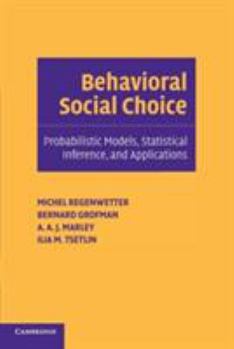Behavioral Social Choice
Select Format
Select Condition 
Book Overview
Behavioral Social Choice looks at the probabilistic foundations of collective decision-making rules. The authors challenge much of the existing theoretical wisdom about social choice processes, and seek to restore faith in the possibility of democratic decision-making. In particular, they argue that worries about the supposed prevalence of majority rule cycles that would preclude groups from reaching a final decision about what alternative they prefer have been greatly overstated. In practice, majority rule can be expected to work well in most real-world settings. Furthermore, if there is a problem, they show that the problem is more likely to be one of sample estimates missing the majority winner in a close contest (e.g., Bush-Gore) than a problem about cycling. The authors also provide new mathematical tools to estimate the prevalence of cycles as a function of sample size and insights into how alternative model specifications can change our estimates of social orderings.
Format:Paperback
Language:English
ISBN:0521536669
ISBN13:9780521536660
Release Date:May 2006
Publisher:Cambridge University Press
Length:258 Pages
Weight:0.76 lbs.
Dimensions:0.6" x 6.1" x 9.0"
Customer Reviews
0 rating





